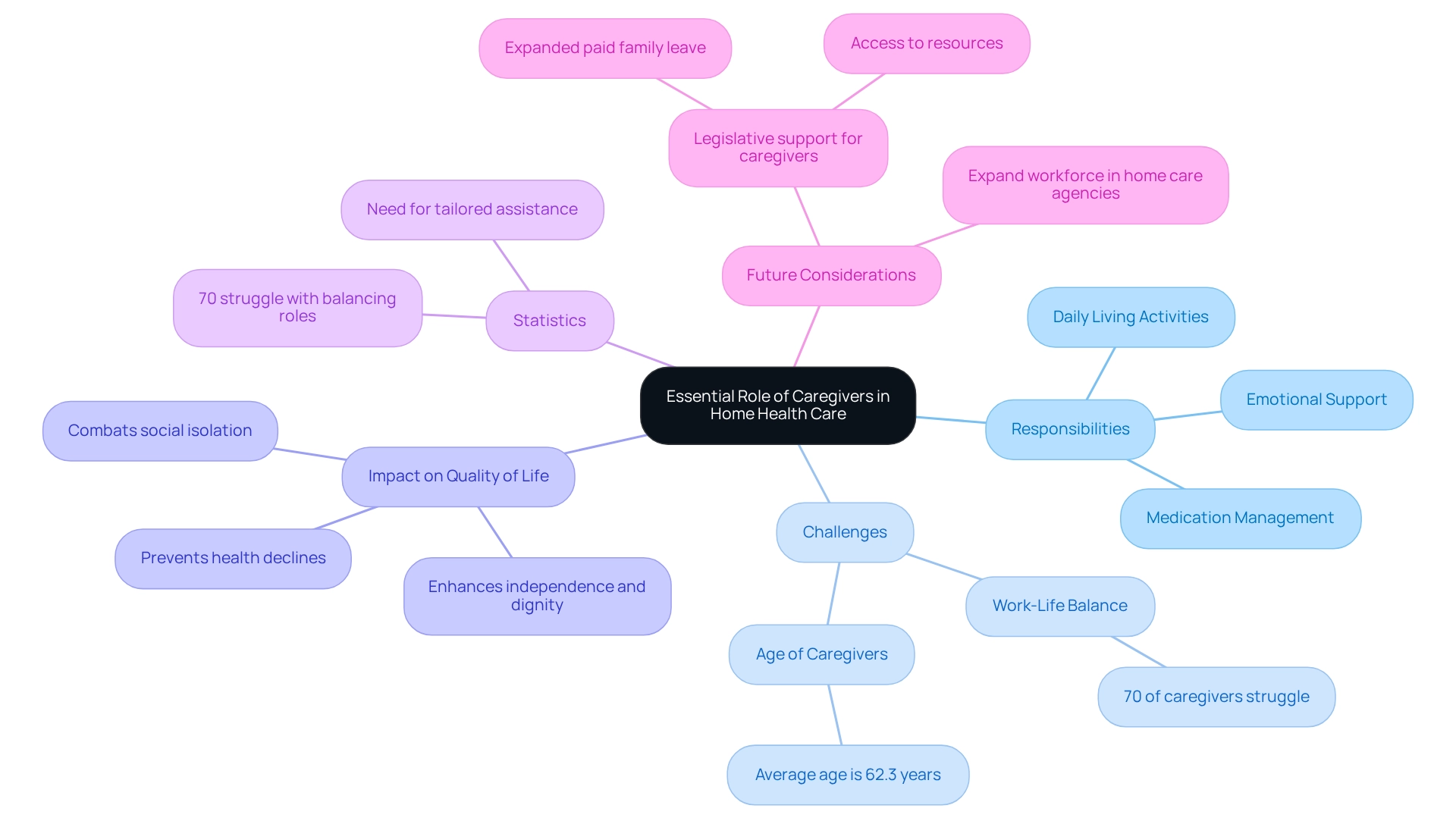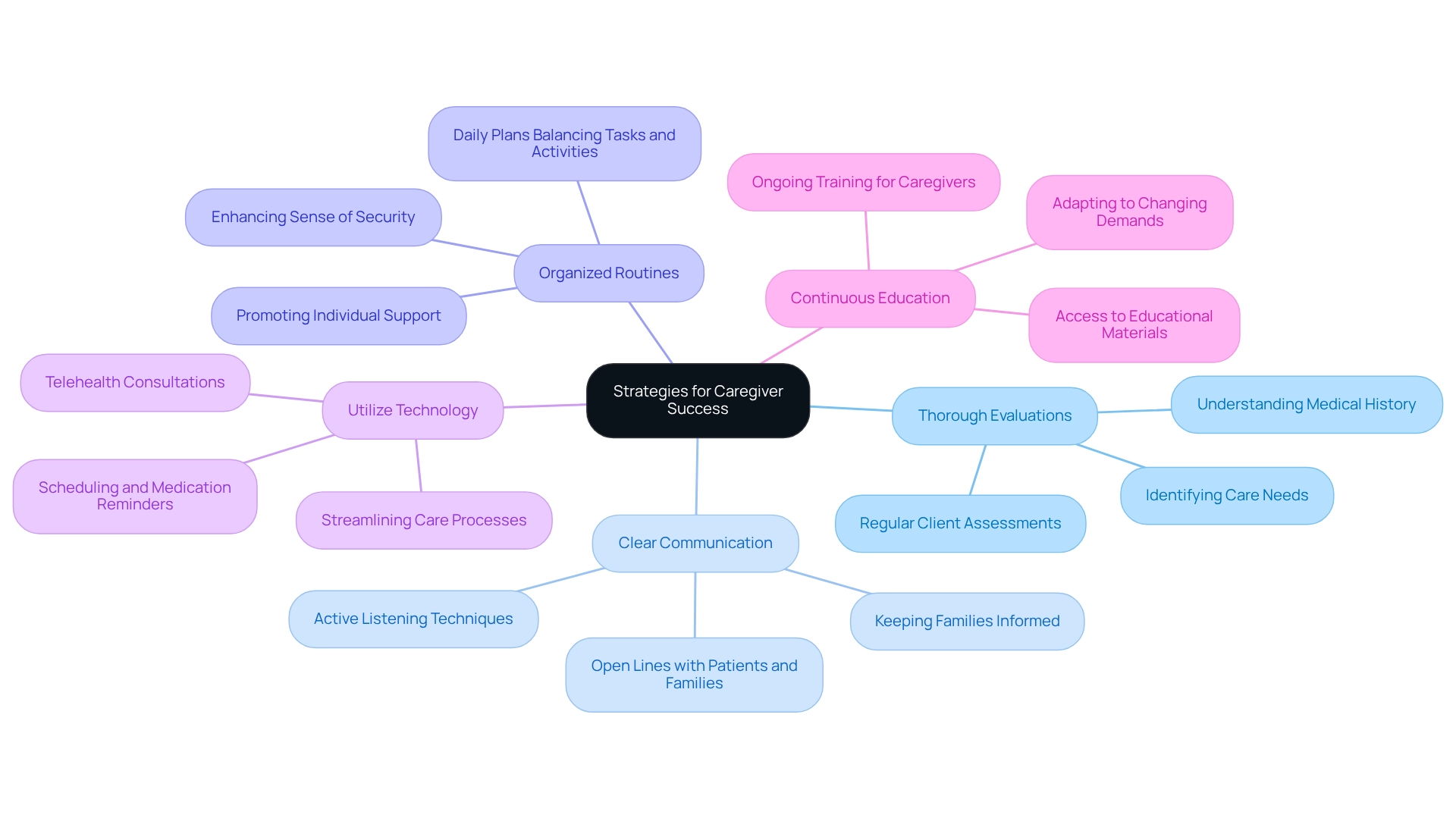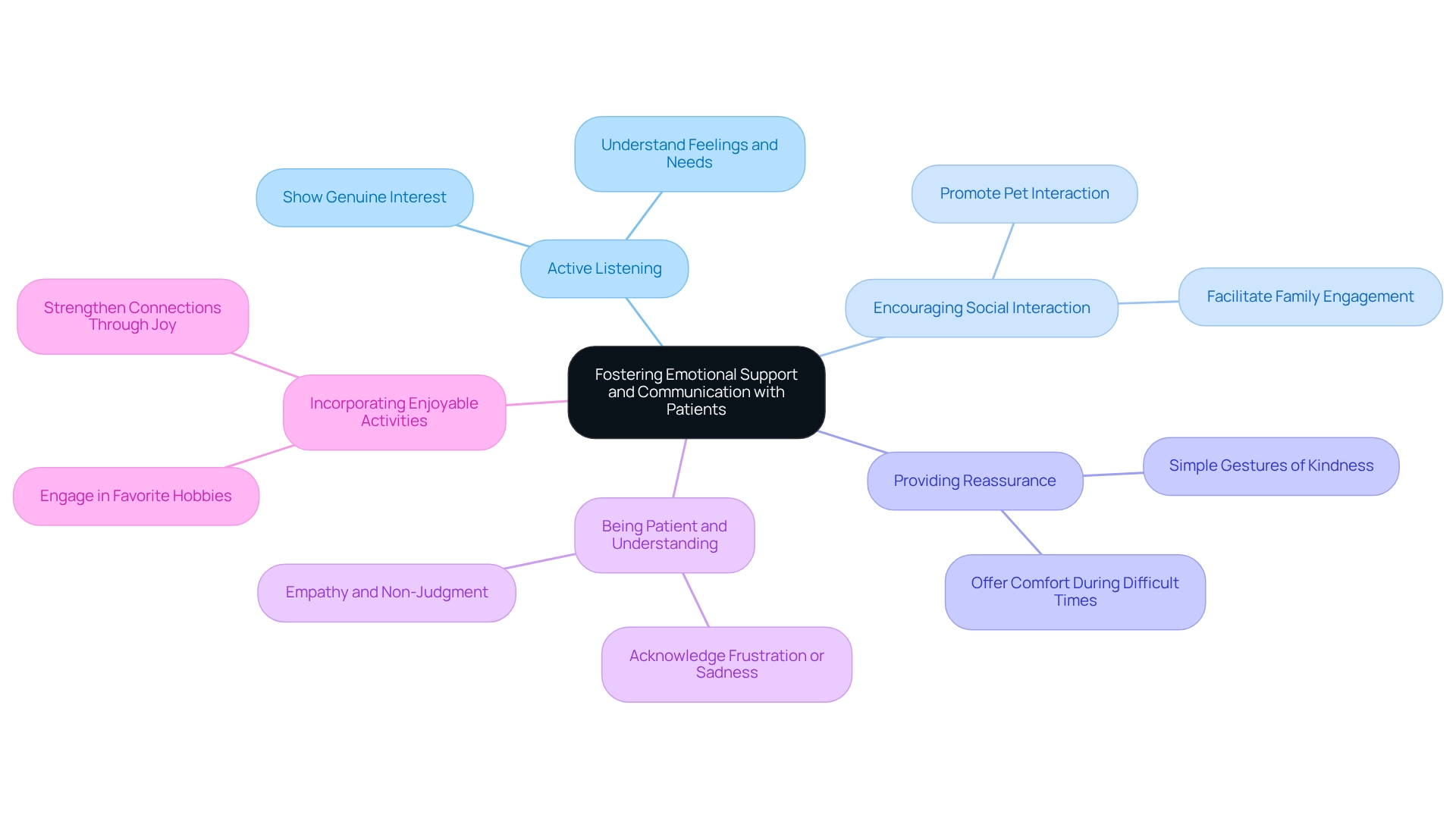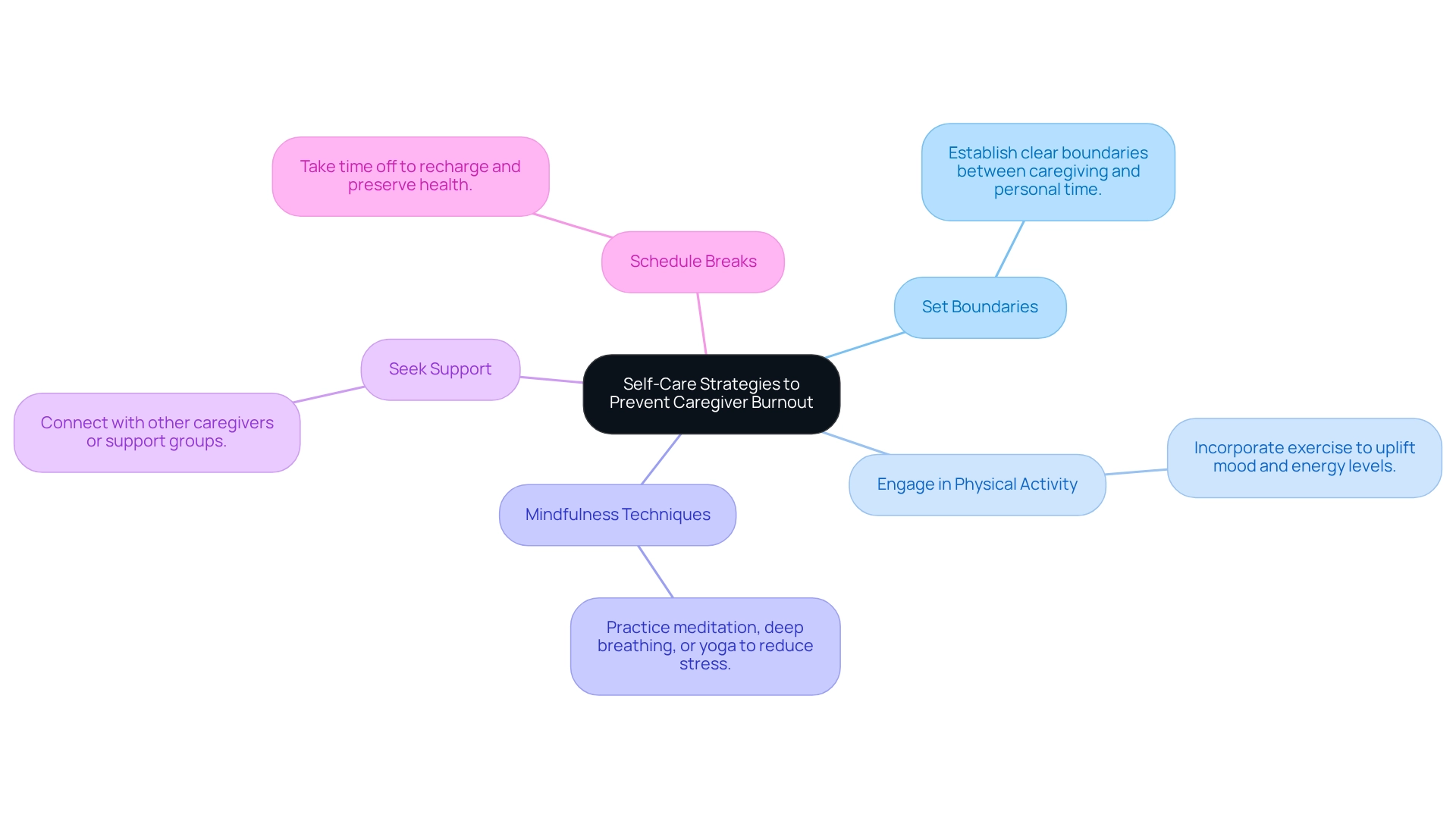Overview
In the journey of home health caregiving, there are four essential practices that can lead to success.
- First and foremost, thorough evaluations are vital. They help us understand the unique needs of each client, ensuring that we provide the best possible care.
- Clear communication follows closely behind, as it fosters trust and understanding between caregivers and clients.
- Organized routines play a crucial role in managing responsibilities effectively. When caregivers have structured plans, it not only enhances the quality of care but also alleviates stress, allowing for a more nurturing environment.
- Finally, ongoing education is key. It empowers caregivers with the latest knowledge and skills, ensuring that they can adapt to the evolving needs of those they assist.
These practices are not just about improving care; they are about supporting caregivers in their vital roles. By embracing these principles, we can achieve better outcomes for both caregivers and clients. Remember, we’re here for you every step of the way, and your comfort is our priority.
Introduction
In the realm of home health care, caregivers emerge as the unsung heroes, providing essential support that goes beyond mere assistance. They play a pivotal role in enhancing the quality of life for seniors and individuals with chronic illnesses, offering everything from daily living aids to emotional companionship. Yet, the challenges they face are significant; many find themselves juggling professional duties alongside their caregiving responsibilities. As the landscape of caregiving evolves, it becomes increasingly vital to understand the critical functions of caregivers—and the support they require.
This article delves into the multifaceted role of caregivers, exploring effective strategies for their success. We emphasize the importance of emotional support and self-care to prevent burnout. By acknowledging their contributions and addressing their needs, we can foster a more sustainable and compassionate caregiving environment. Ultimately, this benefits both caregivers and those they serve. Together, we can create a community that recognizes and uplifts the invaluable work of caregivers.
Understand the Essential Role of Caregivers in Home Health Care
Caregivers home health are the heart of home health care, providing essential support that encompasses physical, emotional, and medical assistance. They help with daily living activities such as bathing, dressing, and meal preparation, while also managing medications and monitoring health conditions. Competent caregivers prioritize the safety and comfort of those they assist, creating a nurturing atmosphere that promotes independence and dignity.
Understanding the vital role caregivers play is crucial for recognizing their significant impact on enhancing the quality of life for seniors and individuals with chronic conditions. Research indicates that about 70% of caregivers struggle to balance their professional responsibilities with caregiving tasks. This highlights the urgent need for robust support systems to help them manage these dual roles. Acknowledging their influence not only empowers caregivers but also fosters trust and rapport with clients, which is essential for effective support in home health services. Current trends reveal that the average age of spousal caregivers is 62.3 years, underscoring the need for tailored assistance for older individuals who may face unique challenges. Additionally, the essential roles of CNAs and HHAs in providing personalized support are pivotal, as they help prevent health declines, ensure proper nutrition, and offer companionship to combat social isolation.
Without CNA/HHA services, seniors encounter considerable risks, including health declines due to lack of monitoring, poor nutrition from inadequate meal preparation, and increased social isolation, which can lead to depression. Looking ahead to 2025, the role of support providers will remain crucial. Home support agencies, like Best Care Nurses Registry, must expand their workforce and enhance service options to meet the growing demands for caregivers home health. Legislative efforts should focus on comprehensive support for caregivers, including expanded paid family leave and access to resources, ensuring they can provide the best possible care while maintaining their own well-being.
By implementing these supportive systems, we can significantly improve the caregiving experience, benefitting both caregivers and those receiving care. If you or a loved one needs assistance, we’re here for you. Contact Best Care Nurses Registry at (888) 203-2529 to discuss your needs and arrange a consultation.

Implement Effective Strategies for Caregiver Success
Achieving success in caregivers home health requires the implementation of effective strategies that enhance both the caregiver’s and the recipient’s experience. Here are essential practices to consider:
- Conduct Thorough Evaluations: Regular evaluations of client requirements are essential for customizing plans that address particular demands. This involves a thorough understanding of medical history, personal preferences, and daily routines, ensuring that care is personalized and effective. Indicators such as difficulty with personal hygiene, dressing, or managing medications can signal the necessity for caregivers home health services. As highlighted in recent case studies, comprehensive assessments are vital for improving patient and family engagement strategies in caregivers home health.
- Establish Clear Communication: Open lines of communication with patients, their families, and healthcare professionals are vital. Employing active listening techniques fosters a deeper understanding of needs and concerns, which is essential for effective caregiving. Caregivers home health play a key role in keeping family members informed about the patient’s condition, making communication a serious priority with significant implications for patient care.
- Establish Organized Routines: Formulating daily plans that balance support tasks with pleasurable activities can greatly improve an individual’s sense of security and involvement. Organized routines enhance overall well-being and assist individuals in feeling more in control of their daily lives. Providers should concentrate on individual support and everyday living tasks in caregivers home health, ensuring that individuals have healthy, fulfilling days at home.
- Utilize Technology: Leveraging technology for scheduling, medication reminders, and telehealth consultations can streamline care processes and improve efficiency. This not only enhances the provider’s ability to offer timely assistance but also empowers clients to manage their health more effectively.
- Seek Continuous Education: Ongoing training and professional development are essential for those providing care to stay informed about best practices and emerging techniques in caregiving. Educational materials are offered in various languages, guaranteeing that guardians can access training that accommodates different requirements. This dedication to education guarantees that caregivers can adjust to the changing demands of those they serve and the healthcare environment.
By applying these strategies, caregivers can improve their efficiency, resulting in better outcomes for individuals and increased satisfaction in their positions. As a reminder, healthcare settings should be safe spaces for people who need treatment — not environments that tolerate discrimination in any form.

Foster Emotional Support and Communication with Patients
Building strong emotional connections with patients is essential for effective caregivers home health, especially in a personalized and pet-friendly environment. Here are some practices to foster emotional support:
-
Practice Active Listening: Show genuine interest in what those you serve have to say. Listening attentively can help you understand their feelings and needs better, leading to more personalized care that respects their preferences, including those related to their pets.
-
Encourage Social Interaction: Facilitate opportunities for individuals to engage with family and friends, as well as their pets. Social connections can significantly enhance their emotional well-being and provide comfort.
-
Provide Reassurance: Offer comfort and reassurance during difficult times. Simple gestures, such as holding a hand or offering a kind word, can make a significant difference in a person’s emotional state, especially when they feel supported by their caregivers home health and their beloved pets.
-
Be Patient and Understanding: Acknowledge that customers may feel frustration or sadness. Approach these situations with empathy and patience, allowing caregivers home health to express their feelings without judgment, while also considering the emotional bond they share with their pets.
-
Incorporate Activities They Enjoy: Involve individuals in activities that bring them joy, whether it’s reading, gardening, or spending time with their pets. This not only lifts their spirits but also fortifies your connection with them, improving their overall quality of life.
To discuss your needs and explore how Best Care Nurses Registry can link you with compassionate support, call (888) 203-2529 to schedule a consultation.

Prioritize Self-Care to Prevent Caregiver Burnout
Burnout among caregivers in home health is a significant risk that can profoundly affect both the provider and the client. To help prevent burnout, it’s essential for caregivers to prioritize self-care through several nurturing strategies:
- Set Boundaries: Establish clear boundaries between caregiving responsibilities and personal time. This practice is vital for maintaining a healthy work-life balance.
- Engage in Regular Physical Activity: Incorporating exercise into your routine can uplift your mood and energy levels. Even short walks can make a remarkable difference.
- Practice Mindfulness and Relaxation Techniques: Techniques such as meditation, deep breathing, or yoga can significantly reduce stress and promote mental clarity.
- Seek Support: Connecting with other caregivers or support groups allows you to share experiences and coping strategies. Remember, you are not alone in this journey, and knowing that can ease feelings of isolation.
- Schedule Regular Breaks: Taking time off to recharge—whether through short breaks during the day or longer periods away from caregiving duties—is crucial for preserving your health and efficiency as a caregiver in home health.
Furthermore, Best Care Nurses Registry offers adaptable respite services that enable caregivers in home health to take much-needed breaks while ensuring clients receive uninterrupted support. Our in-home support staff provide companionship and assistance with daily activities, tailored to meet the unique needs of individuals of all ages. Additionally, we accept most long-term care insurances directly, simplifying the payment process for families. This means that caregivers in home health can focus on their well-being, knowing that professional support is readily available and that financial concerns are managed efficiently. We’re here for you, and your comfort is our priority.

Conclusion
Caregivers stand at the forefront of home health care, providing essential support that enhances the quality of life for seniors and individuals facing chronic illnesses. Their roles extend far beyond basic assistance; they ensure safety, promote dignity, and foster emotional well-being. However, the challenges they face, such as balancing professional duties with caregiving responsibilities, underscore the urgent need for robust support systems. Understanding the unique challenges caregivers encounter, especially as the demographic shifts toward older caregivers, is critical in creating a sustainable caregiving environment.
Implementing effective strategies can significantly improve both caregiver and client experiences. Regular assessments, clear communication, structured routines, and the use of technology are vital practices that empower caregivers to deliver personalized and effective care. Continuous education further equips caregivers with the knowledge needed to adapt to the evolving healthcare landscape. By fostering strong emotional connections and prioritizing self-care, caregivers can mitigate burnout and enhance their overall well-being, ensuring they remain effective in their roles.
Ultimately, recognizing and supporting the invaluable work of caregivers is essential for the health of both caregivers and those they serve. By creating a compassionate community that acknowledges their contributions and addresses their needs, society can cultivate an environment where caregivers thrive, leading to better outcomes for everyone involved. The well-being of caregivers directly influences the quality of care they provide, making it imperative to prioritize their support and resources. Together, a more sustainable and compassionate caregiving landscape can be achieved, benefiting all.
Frequently Asked Questions
What is the role of caregivers in home health care?
Caregivers in home health care provide essential support that includes physical, emotional, and medical assistance. They help with daily living activities such as bathing, dressing, and meal preparation, manage medications, and monitor health conditions.
How do caregivers enhance the quality of life for seniors and individuals with chronic conditions?
Caregivers enhance the quality of life by prioritizing safety and comfort, creating a nurturing atmosphere that promotes independence and dignity, and offering personalized support that prevents health declines and combats social isolation.
What challenges do caregivers face in balancing their responsibilities?
Approximately 70% of caregivers struggle to balance their professional responsibilities with caregiving tasks, highlighting the need for robust support systems to help them manage these dual roles.
What are the average ages of caregivers, and why is this significant?
The average age of spousal caregivers is 62.3 years, which underscores the need for tailored assistance for older individuals who may face unique challenges related to caregiving.
What roles do Certified Nursing Assistants (CNAs) and Home Health Aides (HHAs) play in caregiving?
CNAs and HHAs provide personalized support that is pivotal in preventing health declines, ensuring proper nutrition, and offering companionship to combat social isolation among seniors.
What risks do seniors face without CNA/HHA services?
Without CNA/HHA services, seniors face considerable risks, including health declines due to lack of monitoring, poor nutrition from inadequate meal preparation, and increased social isolation, which can lead to depression.
What is the outlook for caregivers and support providers by 2025?
By 2025, the role of support providers will remain crucial, and home support agencies must expand their workforce and enhance service options to meet the growing demands for caregivers in home health.
What legislative efforts are suggested to support caregivers?
Legislative efforts should focus on comprehensive support for caregivers, including expanded paid family leave and access to resources, ensuring they can provide the best possible care while maintaining their own well-being.
How can individuals access caregiver services?
Individuals needing assistance can contact Best Care Nurses Registry at (888) 203-2529 to discuss their needs and arrange a consultation.











